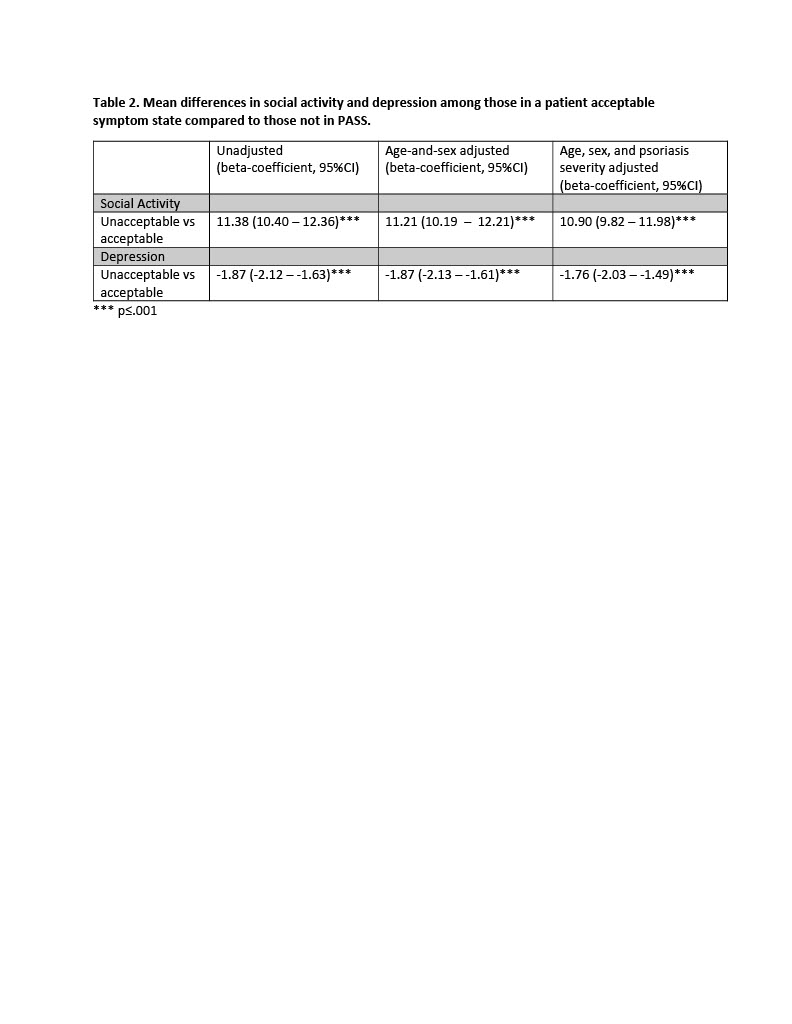Session Information
Date: Friday, November 6, 2020
Title: Patient Outcomes, Preferences, & Attitudes Poster I: RA, Spondyloarthritis, & OA
Session Type: Poster Session A
Session Time: 9:00AM-11:00AM
Background/Purpose: Despite many efficacious therapies for PsA, many patients do not achieve remission. Ongoing disease activity leads to many downstream effects including diminished functional ability, reduction in social interaction and in some cases depression. Furthermore, depression may be associated with ongoing symptoms that can be attributed to PsA. The objective of this study was to determine the prevalence of ‘unacceptable’ symptom states among patients with PsA and to examine the association with being in an unacceptable symptom state with depression and impaired social interaction.
Methods: The National Psoriasis Foundation (NPF) surveyed a random, stratified sample of individuals with psoriatic disease in the US from the NPF’s constituent database. Patients were active members of the NPF within the past 2 years, age >=18, carried a self-reported diagnosis of psoriasis or PsA and had an active email address or phone number. The presence of acceptable vs unacceptable level of disease impact of PsA was assessed using the established patient acceptable symptom state for the PsAID-9 (< =4 on a scale of 0-10). Severity of psoriasis was defined by body surface area (BSA, Mild < 3%, Moderate to Severe ≥ 3%) as reported by patients using the Patient Report of Extent of Psoriasis Involvement (PREPI). Linear regression analyses were conducted to compare outcomes of individuals with acceptable level of PsA activity with those who have unacceptable level of PsA activity while adjusting for severity of PsO. Outcomes of interest were depression and ability to participate in social roles and activities. Depression was assessed by a two-stage assessment process utilizing the PhQ-2 and PhQ-9. The PhQ-2 is utilized in this analysis. Ability to participate in social roles and activities was assessed by the PROMIS Ability to Participate in Social Role and Activities-SF4a. Descriptive statistical analyses were conducted with SPSS Ver 26 and ANOVA and linear regression analyses were conducted in STATA SE Ver 9.
Results: Among 23,340 patients sent a survey, 1,570 individuals completed the survey, including 834 who reported being diagnosed with PsA by a healthcare provider and 801 (96.0%) completed the PSAID. Among individuals who self-reported diagnosis of PsA and completed the PsAID-9, 59.6% reported unacceptable level of disease activity (PSAID >4) and 40.4% reported acceptable level of disease activity. After adjusting for age, sex, and severity of PsO, statistically significant differences were found between individuals with unacceptable level of PsA activity and acceptable level of PsA activity for depression [2.56 (SD 2.00) vs 0.08 (SD 1.25, p≤.001] and ability to participate in social roles and activities [mean T-scores 44.56 (SD 6.83) vs 55.46 (SD 6.99), p≤.001].
Conclusion: Not being in a patient acceptable symptom state is common in this US-based population of patients with PsA and is associated with significant decrements in social activity and increase prevalence of depression. Being monitored by a dermatologist or rheumatologist was associated with an increased likelihood of being in a patient acceptable symptom state.
 Table 1 – Patient characteristics
Table 1 – Patient characteristics
 Table 2. Mean differences in social activity and depression among those in a patient acceptable symptom state compared to those not in PASS.
Table 2. Mean differences in social activity and depression among those in a patient acceptable symptom state compared to those not in PASS.
To cite this abstract in AMA style:
Ogdie A, Gondo G, Merola J, Bell S, Gottlieb A. Prevalence and Impact of Unacceptable Symptom State Among Patients with Psoriatic Arthritis: Results from the National Psoriasis Foundation’s 2019 Annual Survey [abstract]. Arthritis Rheumatol. 2020; 72 (suppl 10). https://acrabstracts.org/abstract/prevalence-and-impact-of-unacceptable-symptom-state-among-patients-with-psoriatic-arthritis-results-from-the-national-psoriasis-foundations-2019-annual-survey/. Accessed .« Back to ACR Convergence 2020
ACR Meeting Abstracts - https://acrabstracts.org/abstract/prevalence-and-impact-of-unacceptable-symptom-state-among-patients-with-psoriatic-arthritis-results-from-the-national-psoriasis-foundations-2019-annual-survey/
